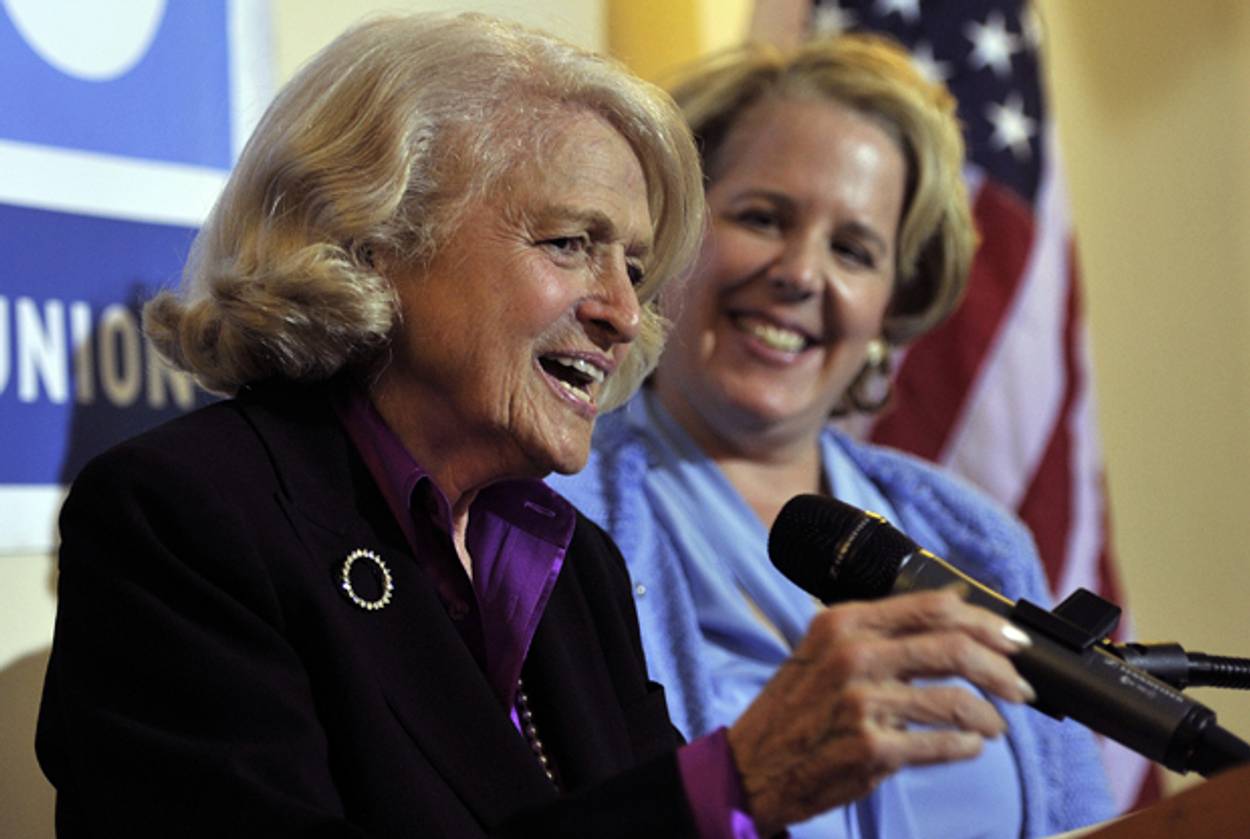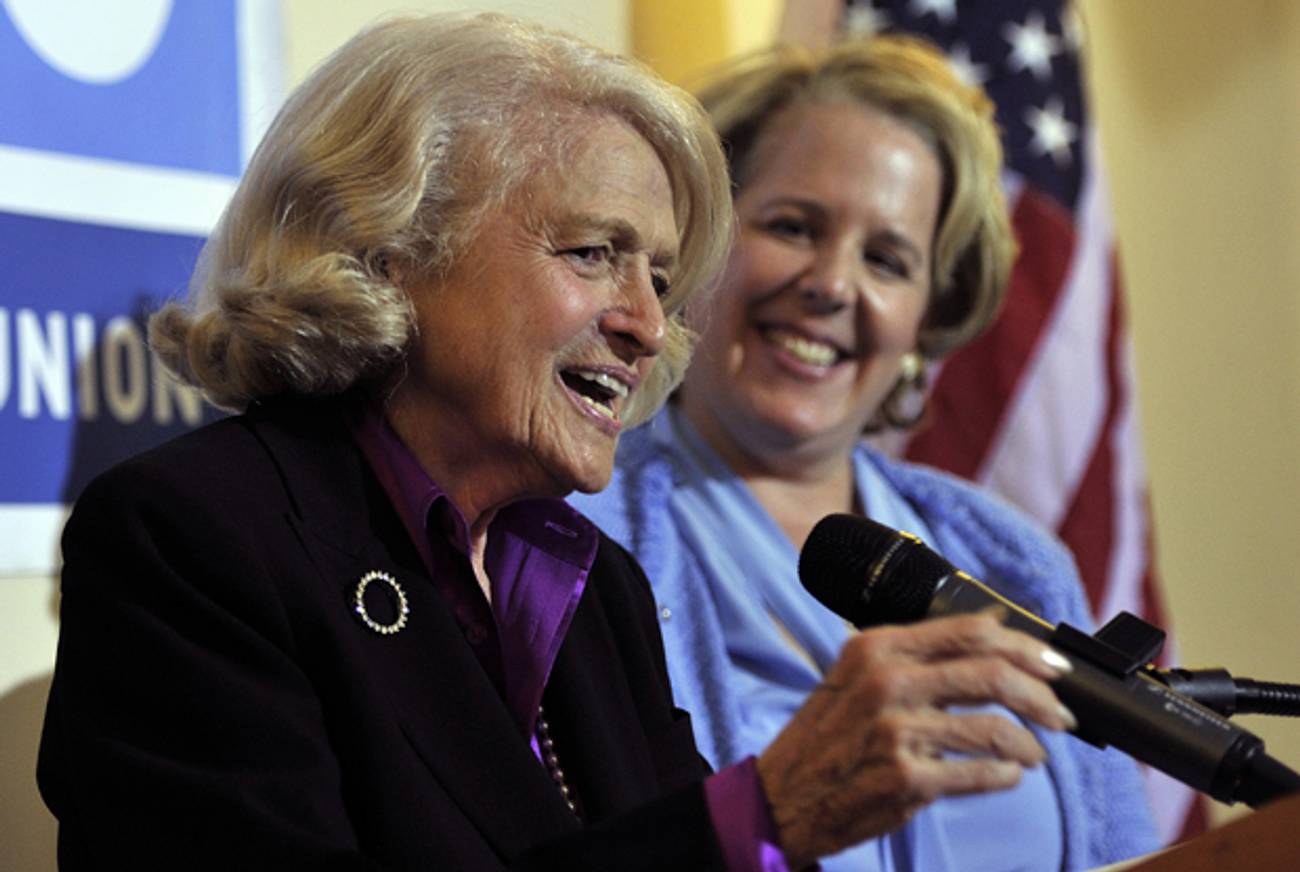A Pride Weekend Shabbat For the Ages
After the DOMA ruling, Edith Windsor and Roberta Kaplan’s Shabbat service




The longer the line, the better the night—a New York mantra usually reserved for suckers unwilling to go to the dive next door. But on Friday, June 28, the crowd wrapped around Ninth Ave., eagerly awaiting entry to the Congregation Beit Simchat Torah Shabbat service at Chelsea Sanctuary, was not wasting any time. Just three days after the Supreme Court invalidated the Defense of Marriage Act, the women who won, plaintiff Edith Windsor and her attorney Roberta Kaplan, would be speaking at the Pride weekend service, and it was the most sought-out ticket in town.
There was commotion in the queue. People trying to get inside were arguing, politely but sternly, with the synagogue directors, who served as bouncers. Though the line moved glacially, a group of 25 people were summoned inside. We were seated on the floor of the packed room hot with too many bodies, but no one seemed perturbed. A woman in a leg brace rested her foot on a stranger’s lap, and a woman with a bad back leaned against the wall. “Can you believe this?” she said, “We are seeing history in the making.”
The service kicked off with a dedication to Thea Spyer, Windsor’s partner, who died in 2009. But aside from the moment of remembrance, the night was marked by cheers, slow claps, and Shabbat prayers, which were sung with almighty spirit by a choir wearing rainbow-decorated tallitot. “Don’t postpone joy” was something Spyer always said, so despite all the hardships in the world, Rabbi Sharon Kleinbaum explained, the evening was going to be a celebration.
First up was mayoral candidate and New York’s first openly gay speaker, Christine Quinn. “The ticket to get in here is tougher than Cher at the Pier on Sunday night!” she exclaimed to hundreds of laughs. But her speech was more profound than humorous. She explained that while other lawyers turned down Windsor’s case, Kaplan said yes.
“God put you here on purpose,” said Quinn, thanking Kaplan for using her gift of brilliance in the courtroom. To Windsor, she said, “You’re a modern day miracle,” inciting roaring cheers from those who couldn’t get in, waiting outside in the light rain. The whole synagogue then sang. Lechu Neranena never sounded so good.
The evening went on with soon-to-be memorable moments. At one point, somewhat sacrilegiously, phones lit up with the news that U.S. 9th Circuit in California approved the resumption of same-sex marriage. Later, a woman proposed to her partner on stage. And finally, the moment we’d all been waiting for: Kaplan came to the stage. She delivered Parshat Pinchas, and explained its reference to current events. The five daughters of Zelophehad were not, like all women of the time, counted in the census. So when Zelophehad died, they were not in line to receive his inheritance. But the women spoke up against the injustice, and God modified the law. From then on, women were counted in the census.
Kaplan said that this parsha proved the revisionist nature of Judaism. Belief that Jewish law is set in stone “is not the proper interpretation of our beliefs,” said Kaplan. “Laws change when ethical situations require it…and I’m honored to tell you that the Supreme Court ultimately agreed with me.”
Finally, it was Windsor’s turn, and everyone, even those on the floor, stood up to get closer to the small, but commanding woman. How did DOMA finally get repealed? “We came out in increasing numbers and we see each other and we love each other,” she explained. “What a life I have.” She spoke for just a few moments, but took the opportunity to announce that she would be joining CBST, the temple that since 1973, has been open to Jewish LGBTQ New Yorkers.
The chorus started singing “L’Dor Vador,” and the congregation did too; those seated in chairs, on the floors, and outside, in the post-rain humidity, with fireflies flying around their umbrellas. Everyone together for a night that was worth the wait.
Related: Gay Marriage’s Legal Crusader [Tablet]
Previous: Jewish Thought in the DOMA Ruling
Why Today is Different From All Other Days
Supreme Court Strikes Down DOMA
Romy Zipken is a writer and editor at Jewcy. Her Twitter feed is @RomyZipken.